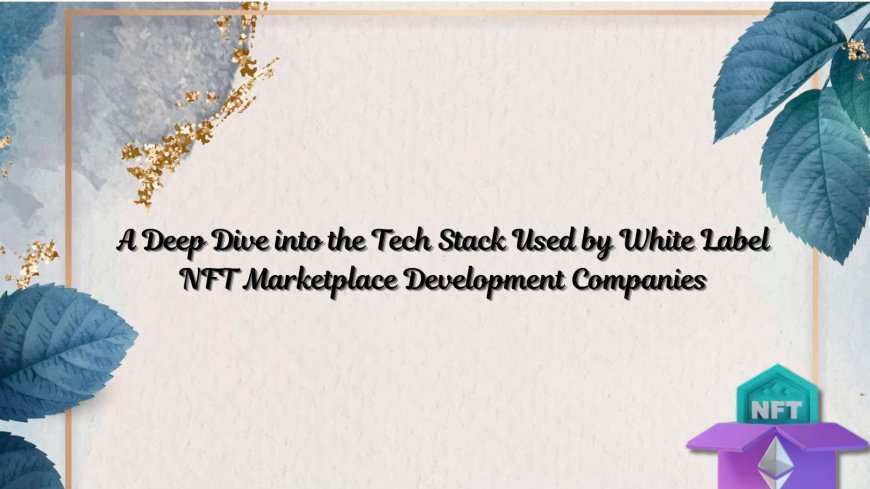A Deep Dive into the Tech Stack Used by White Label NFT Marketplace Development Companies

White-label solutions are driving the need for NFT marketplaces as a result of the increasing acceptance of NFTs (Non-Fungible Tokens). Businesses may quickly enter the blockchain ecosystem with these adaptable systems. These platforms' smooth user experience is made possible by a strong and advanced tech stack. Let's examine the key technologies used by development firms for white-label NFT marketplaces.
The use of blockchain technology
Blockchain is the foundation of all NFT marketplaces. Because of its well-established ecosystem and compatibility with ERC-721 and ERC-1155 standards, Ethereum continues to be the most often used option. However, due to their scalability, reduced transaction fees, and environmental friendliness, other blockchain platforms such as Binance Smart Chain (BSC), Polygon, Solana, and Tezos are becoming more and more popular. The project's objectives, target market, and intended cost effectiveness all influence the blockchain selection.
Smart Contracts
The foundation of NFT marketplaces are smart contracts, which allow for safe and automated transactions. The tasks of minting, listing, purchasing, and transferring NFTs are managed by these self-executing contracts. Smart contracts are frequently written in development languages like Solidity (for Ethereum) and Rust (for Solana).
Front end Technologies
The NFT marketplace's front end, or user interface, needs to be responsive and easy to use. For creating dynamic user interfaces, technologies like React.js, Angular.js, and Vue.js are commonly utilised. Smooth communication between the front end and blockchain is ensured by integration with APIs.
Back end Technologies
The platform's logic, database administration, and blockchain node integration are all handled by the back end. For this, developers frequently utilise frameworks like Ruby on Rails, Node.js, or Python (Django or Flask). These technologies guarantee effective data storage, user authentication, and transaction processing.
Data base solutions
NFT marketplaces employ databases to handle user information, NFT metadata, and transaction histories. Both NoSQL databases like MongoDB and relational databases like PostgreSQL or MySQL are utilised. Furthermore, decentralised NFT metadata storage and retrieval depend heavily on IPFS (InterPlanetary File System).
Wallet integration
To enable safe transactions, wallets such as MetaMask, Trust Wallet, and Coinbase Wallet are integrated. Two popular libraries for smooth wallet communication are WalletConnect and Web3.js.
Security
Security in NFT marketplaces is crucial. Standard precautions include multi-factor authentication (MFA), DDoS protection, and SSL certifications. Smart contract audits also guarantee the platform's resilience to flaws.
In summary, state-of-the-art blockchain technology is combined with reliable front-end and back-end solutions in the tech stack that powers white-label NFT marketplace. Businesses can provide safe, scalable, and intuitive platforms that are suited to the changing requirements of the NFT ecosystem because to this synergy.
Easily launch your own white label NFT Markteplace development company. secure, scalable, and adaptable systems driven by state-of-the-art blockchain technology. A faultless user experience is ensured by solid smart contracts, intuitive designs, and seamless integration. Give your company the tools it needs to succeed in the thriving NFT ecosystem right now!
What's Your Reaction?























